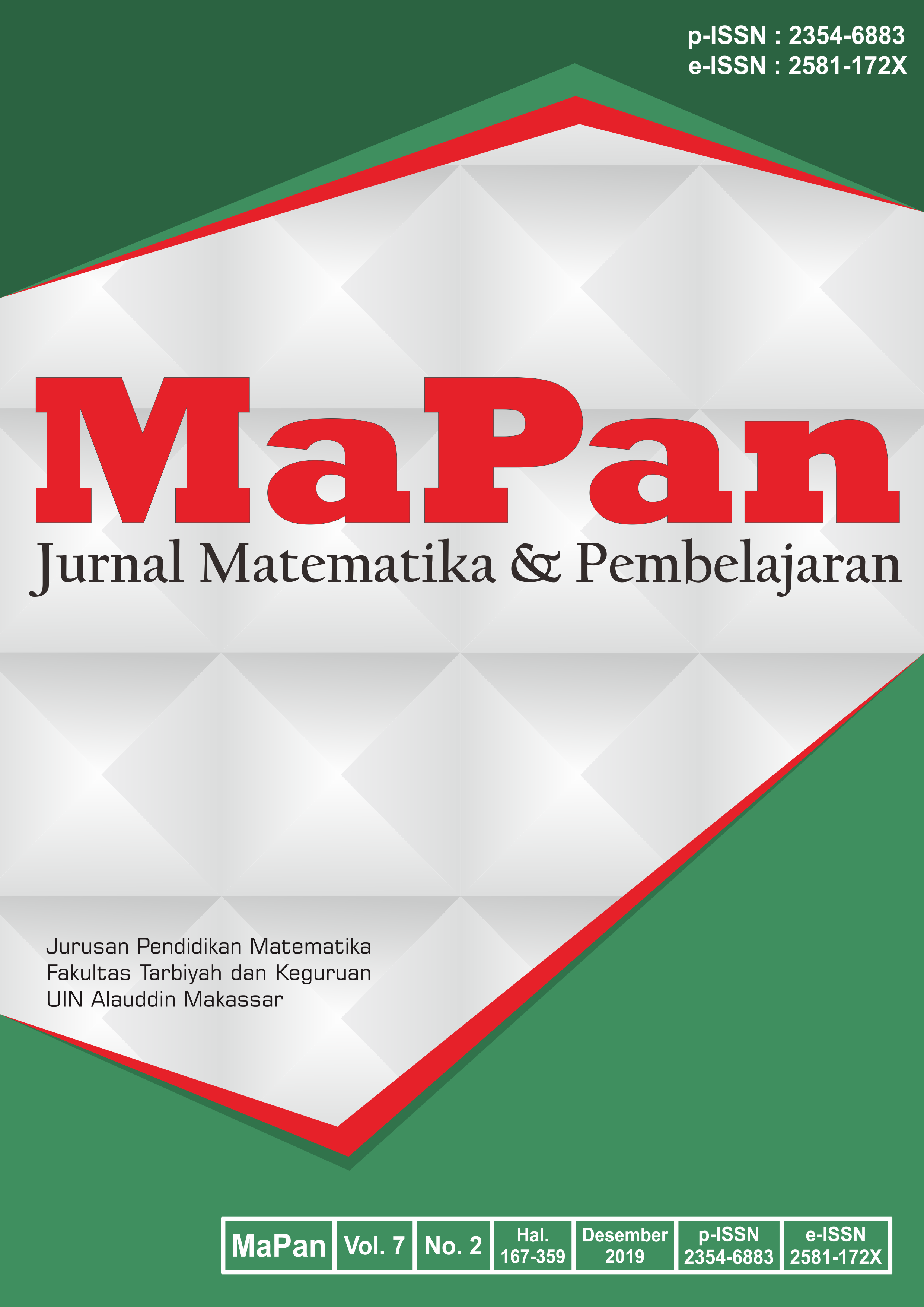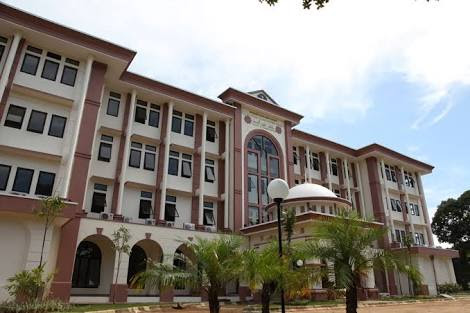MODEL PEMBELAJARAN KOOPERATIF DENGAN PENDEKATAN RECIPROCAL TEACHING DAN CONTEXTUAL TEACHING AND LEARNING TERHADAP KEMAMPUAN KOMUNIKASI MATEMATIKA SISWA
Abstract
Abstrak:
Penelitian ini bertujuan untuk mengetahui keefektifan model pembelajaran kooperatif dengan pendekatan reciprocal teaching dan model pembelajaran kooperatif dengan pendekatan contextual teaching and learning serta membandingkan keefektifan dari kedua model pembelajaran terhadap kemampuan komunikasi matematika siswa kelas X SMK Santo Aloisius Ruteng. Penelitian ini merupakan penelitian eksperimen semu dengan desain penelitian pretest-posttest-only control group design. Pengambilan sampel menggunakan teknik random sampling, dengan terlebih dahulu dilakukan uji kesetaraan kelas. Data dikumpulkan dengan menggunakan teknik tes yang berbentuk uraian. Data dianalisis dengan menggunakan uji t. Berdasarkan hasil analisis data diperoleh: (1) model pembelajaran kooperatif dengan pendekatan reciprocal teaching efektif terhadap kemampuan komunikasi matematika siswa; (2) model pembelajaran kooperatif dengan pendekatan contextual teaching and learning efektif terhadap kemampuan komunikasi matematika siswa; dan (3) model pembelajaran kooperatif dengan pendekatan reciprocal teaching lebih efektif dibandingkan model pembelajaran kooperatif dengan pendekatan contextual teaching and learning terhadap kemampuan komunikasi matematika siswa. Hasil penelitian ini diharapkan menjadi masukan bagi guru untuk terus melakukan inovasi pembelajaran dalam menunjang pencapaian hasil belajar siswa. Beberapa metode yang dapat digunakan adalah reciprocal teaching dan contextual teaching and learning.
Abstract:
This study aimed to know the effectiveness of cooperative learning with reciprocal teaching approach and the effectiveness of cooperative learning with contextual teaching and learning. It also compared the effectiveness between the two learning approaches toward the mathematical communication skills of the tenth grade students in SMK Santo Aloisius Ruteng. This research used quasi-experimental design which used pretest-posttest. The population of this research was all the tenth grade students consisting of five classes. The sampling technique used was random sampling with equality test in the beginning of sampling process. The data were obtained through test then analyzed using t-test. The results showed that: 1) the cooperative learning with reciprocal teaching approach was effective for students' mathematical communication skills; 2) the cooperative learning with contextual teaching and learning approach was effective for students' mathematical communication skills; and 3) the cooperative learning with reciprocal teaching approach was more effective for students' mathematical communication skills than the cooperative learning with contextual teaching and learning approach. Thus, the result of this research was expected that the teachers do innovative teaching approach to enhance students' mathematics learning outcomes. Several of the teaching approaches that can be implemented are reciprocal teaching and contextual teaching and learning.
Downloads
References
Agustyaningrum, N., & Widjajanti, D. B. (2013). Pengaruh pendekatan CTL dengan setting kooperatif tipe kancing gemerincing terhadap kemampuan komunikasi matematis, kepercayaan diri, dan prestasi belajar matematika siswa SMP. Phytagoras: Jurnal Pendidikan Matematika, 8(2), 171–180. Retrieved from https://journal.uny.ac.id/index.php/py
thagoras/article/view/8946/pdf.
Asnawati, S. (2017). Peningkatan kemampuan komunikasi matematis siswa smp dengan pembelajaran kooperatif tipe teams-gamestournaments. Jurnal Euclid, 3(2), 561–567. https://doi.org/doi.org/10.33603/e.v3i2.332.
Depdiknas. (2006). Permendiknas no 22 tahun 2006 tentang standar isi. Jakarta: Departemen Pendidikan Nasonal RI.
Doolittle, P., Hicks, D., Triplett, C., Nichols, W., & Young, C. (2006). Reciprocal teaching for reading comprehension in higher education: A strategy for fostering the deeper understanding of texts. International Journal of Teaching and Learning in Higher Education, 17(2), 106–118. Retrieved from https://pdfs.semanticscholar.org/1916/159cca2ce7e4f452c3ca081cbdc5dbf22abd.pdf.
Duha, A. K., Yerizon, & Suherman. (2012). Penerapan model think pair share terhadap pemahaman konsep. Jurnal Pendidikan Matematika, 1(1), 8–12. Retrieved from https://docplayer.info/61939966-Penerapan-model-think-pair-share-terhadap-pemahaman-konsep.html.
Fahrullisa, R., Putra, F. G., & Supriadi, N. (2018). Pengaruh model pembelajaran kooperatif Tipe Think Pair Share (TPS) berbantuan pendekatan investigasi terhadap kemampuan komunikasi matematis. NUMERICAL: Jurnal Matematika dan Pendidikan Matematika, 2(2), 145–152. https://doi.org/doi.org/10.25217/numerical.v2i2.213.
Harahap, T. H. (2015). Penerapan contextual teaching and learning untuk meningkatkan kemampuan koneksi dan representasi matematika siswa kelas VII-2 SMP Nurhasanah Medan tahun pelajaran 2012/2013. Jurnal EduTech, 1(1). Retrieved from https://media.neliti.com/media/publications/42693-ID-penerapan-contextual-teaching-and-learning-ctl-untuk-meningkatkan-kemampuan-kone.pdf.
Hutagalung, R. (2017). Peningkatan kemampuan pemahaman konsep matematis siswa melalui pembelajaran guided discovery berbasis budaya toba di SMP Negeri 1 Tukka. MES (Journal of Mathematics Education and Science), 2(2), 70–77. Retrieved from https://jurnal.uisu.ac.id/index.php/mesuisu/article/view/133/110.
Ketong, S., Burhanuddin, & Asri, W. K. (2018). Keefektifan model pembelajaran reciprocal teaching dalam kemampuan membaca memahami siswa kelas XI IPA SMA Negeri 11 Makassar. Eralingua: Jurnal Pendidikan Bahasa Asing dan Sastra, 2(1), 45–54. Retrieved from https://ojs.unm.ac.id/eralingua/article/viewFile/5629/3274
NCTM. (2000). Principles and standards for school mathematics. Reston, VA: NCTM.
Palincsar, A. S., & Brown, A. L. (2007). Reciprocal teaching of comprehension-monitoring activities. University of Illinois at Urbana-Champaign.
Purwaningsih, R., Sugiharto, & Utami, B. (2013). Studi komparasi metode pembelajaran kooperatif tipe Numbered Heads Together (NHT) dan Think Pair Share (TPS) dengan media roda impian terhadap prestasi belajar siswa pada pokok bahasan sistem periodik unsur kelas X Semester 1 SMAN I Purwantoro tahun pelajaran 2012/2013. JPK, Jurnal Pendidikan Kimia, 2(2), 66–74. Retrieved from https://core.ac.uk/download/pdf/20332879.pdf.
Qohar, A., & Sumarmo, U. (2013). Improving mathematical communication ability and self regulation learning of yunior high students by using reciprocal teaching. IndoMS. J. M. E, 4(1), 59–74. Retrieved from https://ejournal.unsri.ac.id/index.php/jme/article/view/562/160.
Rahmi, S., Nadia, R., Hasibah, B., & Hidayat, W. (2017). The relation between self-efficacy toward math with the math communication competence. Infinity Journal, 6(2), 177–182. https://doi.org/10.22460/infinity.v6i2.p177-182.
Ratnasari, S. F., & Saefudin, A. A. (2018). Efektivitas pendekatan Contextual Teaching and Learning (CTL) ditinjau dari kemampuan komunikasi matematika siswa. MaPan : Jurnal Matematika dan Pembelajaran, 6(1), 119–127. https://doi.org/10.24252/mapan.2018v6n1a11.
Rofik, A. (2015). Pembelajaran matematika model contextual teacing and learning dengan pendekatan problem posing berbantuan elearning materi dimensi tiga kelas X untuk meningkatkan kemampuan pemecahan masalah. Jurnal Euclid, 2(2), 352–358. https://doi.org/doi.org/10.33603/e.v2i2.369.
Sanjaya, W. (2008). Pembelajaran dalam implementasi kurikulum berbasis kompetensi. Jakarta: Kencana.
Selvianiresa, D., & Prabawanto, S. (2017). Contextual teaching and learning approach of mathematics in primary schools. Journal of Physics: Conference Series, 895(1), 1–7. https://doi.org/10.1088/1742-6596/895/1/012171.
Sukardi, A. D., Susilo, H., & Zubaidah, S. (2015). Pengaruh pembelajaran reciprocal teaching berbantuan peta pikiran (mind map) terhadap kemampuan metakognitif dan hasil belajar siswa SMA. JPS (Jurnal Pendidikan Sains), 3(2), 81–89. https://doi.org/10.17977/jps.v3i2.7656.
Surdin. (2018). The effect of contextual teaching and learning (ctl) models on learning outcomes of social sciences of the material of forms the face of the earth on class VII of junior high school. International Journal of Education and Research, 6(3), 57–64. Retrieved from https://www.ijern.com/journal/2018/March-2018/08.pdf.
Surya, E., Syahpurta, E., & Juniati, N. (2018). Effect of problem based learning toward mathematical communication ability and self-regulated learning. Journal of Education and Practice, 9(6), 14–23. Retrieved from https://pdfs.semanticscholar.org/0d28/da678a036373c69aa11846002f2802a1a1cd.pdf.
Syidhi, S. M., & Listyani, E. (2017). Effectiveness of reciprocal teaching model with concept mapping strategy in terms of mathematical problem solving skills of junior high school students. Jurnal Pendidikan Matematika dan Sains, 6(7), 35–45. Retrieved from http://journal.student.uny.ac.id/ojs/index.php/pmath/article/download/7873/7499.
Yunita, Y. E., Santosa, S., & Ariyanto, J. (2011). Penerapan pendekatan pengajaran terbalik (reciprocal teaching) untuk meningkatkan kemandirian belajar biologi siswa kelas VII-G SMP N 5 Karanganyar tahun pelajaran 2010/2011. Jurnal Pendidikan Biologi, 3(2), 43–54. Retrieved from https://media.neliti.com/media/publications/118837-ID-penerapan-pendekatan-pengajaran-terbalik.pdf.
Zaini, A., & Marsigit, M. (2014). Perbandingan keefektifan pembelajaran matematika dengan pendekatan matematika realistik dan konvensional ditinjau dari kemampuan penalaran dan komunikasi matematik siswa. Jurnal Riset Pendidikan Matematika, 1(2), 152–163. https://doi.org/10.21831/jrpm.v1i2.2672.


